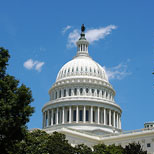Full House passes Defense bill with three anti-gay amendments
 The U.S. House on Thursday, May 26, passed the House Armed Services Committee authorization bill that includes three amendments aimed at delaying implementation of the repeal of Don’t Ask, Don’t Tell and shoring up the impact of the Defense of Marriage Act.
The U.S. House on Thursday, May 26, passed the House Armed Services Committee authorization bill that includes three amendments aimed at delaying implementation of the repeal of Don’t Ask, Don’t Tell and shoring up the impact of the Defense of Marriage Act.
Meanwhile, the U.S. Senate on Wednesday, May 25, rejected two budget proposals for Fiscal Year 2012 appropriations—one that LGBT activists liked and one they didn’t like.
The House vote Thursday was 322 to 96 on the National Defense Authorization Act (NDAA), which authorizes spending by the Defense Department for Fiscal Year 2012. The three amendments included one that seeks to require additional certifications before repeal of Don’t Ask, Don’t Tell (DADT) can take place and two which reiterate that the Defense of Marriage Act (DOMA) bars the use of military facilities or personnel for same-sex marriage ceremonies.
The Senate is unlikely to include similar language in its version of the NDAA, so the real showdown on the measures won’t occur until a Senate-House conference committee meets later this year to hammer out one version of the measure.
By that time, one of the amendments may have become moot. The Defense Department has said it expects the Secretary of Defense and Chairman of the Joint Chiefs of Staff should be able to certify the military’s readiness to enact repeal of DADT by mid-summer. Assuming the president does so at the same time, the repeal would be enacted 60 days after that—or sometime in October. The Senate-House conference committee will likely not be ready to meet until sometime after that.
The two DOMA-related amendments have already had their impact—prompting a Navy official to withdraw recommendations that military facilities and personnel be allowed to participate in same-sex ceremonies in states where same-sex marriages are legal. Even if the amendments survive conference committee, DOMA is under serious challenge in the federal courts.
The White House issued a statement Tuesday, saying that, while it generally supports the FY 2012 NDAA passed by the House Armed Services Committee, it objected to the three anti-gay amendments inserted during committee debate.
“The Administration strongly objects to any legislative attempts to directly or indirectly undermine, prevent, or delay the implementation of the repeal, as such efforts create uncertainty for servicemembers and their families,” said the White House statement. The White House “strongly objects” to a number of other provisions in the NDAA budget that the House kept in its final version of the bill even though President Obama has threatened to veto the measure should with those provisions.
The White House did not threaten to veto the bill over the Don’t Ask, Don’t Tell amendments.
Aubrey Sarvis, head of the Servicemembers Legal Defense Network (SLDN), said he was “heartened to see the White House standing firm against attempts to use the defense spending bill as a vehicle for delaying or derailing repeal and expanding DOMA.”
The bigger question looming over budget matters this week is what sort of budget will ever gain passage in Congress for FY 2012.
The budget LGBT and HIV activists generally supported was President Obama’s initial budget proposal for FY 12, a budget which included modest increases in programs against HIV and bullying. That proposal went down 97 to 0 in the Senate Wednesday, mostly because Democrats have shifted their support over to a revised proposal from Obama that promises a more aggressive effort at reducing the current deficit. The nuts and bolts of that proposal has yet to be released.
The budget LGBT activists didn’t like was one authored chiefly by Rep. Paul Ryan (R-Wisc.) that included dramatic reductions in domestic spending. That proposal passed the House last month and has been hotly debated ever since. Among the proposal’s more controversial cuts were in Medicare, which provides health insurance coverage for Americans 65 and older and for people with disabilities, including AIDS. It would also have left unfunded, President Obama’s Affordable Care Act, which provides care for many people with HIV. A motion to consider Ryan’s plan failed by a vote of 40 to 57.
Among the senators voted against proceeding to Ryan’s bill were Republicans Scott Brown of Massachusetts, Olympia Snowe and Susan Collins of Maine, Lisa Murkowski of Alaska, and Rand Paul of Kentucky. All other Republicans voted to consider the bill, all Democrats against.


Leave a Reply